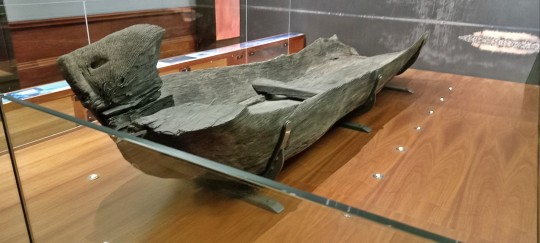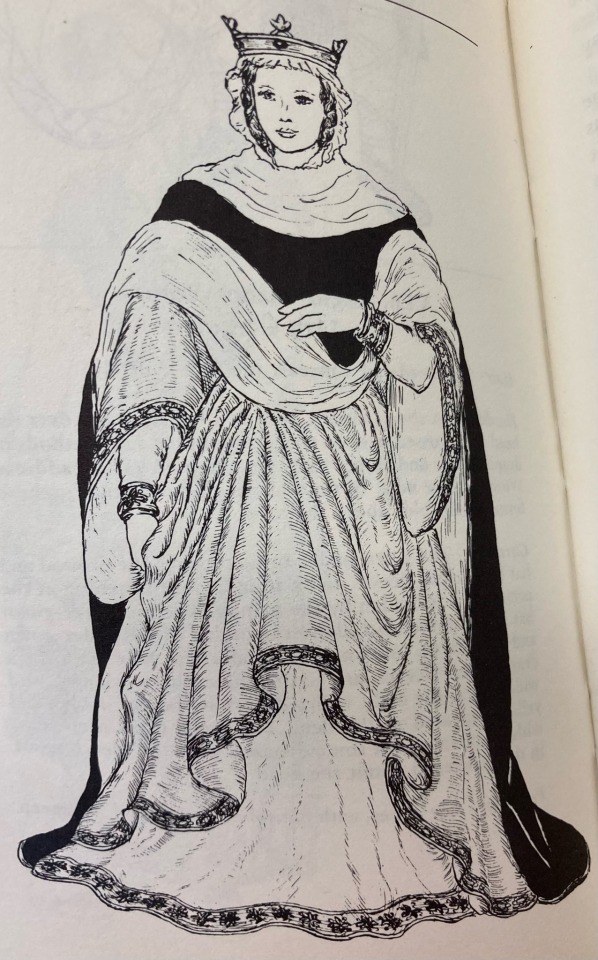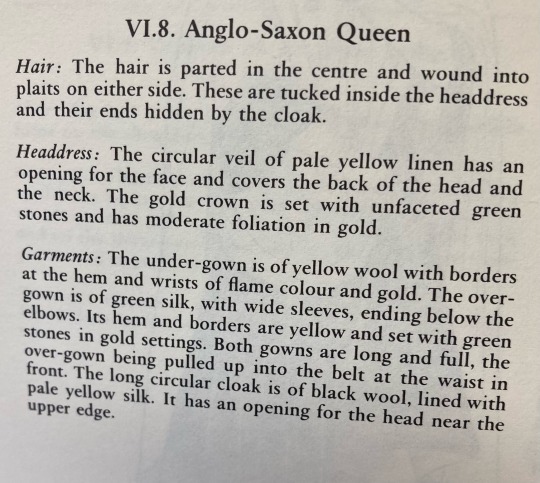#Early Middle Ages
Explore tagged Tumblr posts
Text

New Medieval Books: Waltharius: The Latin Epic of Walther of Aquitaine
47 notes
·
View notes
Text

Pendants uncovered near Kent, Anglo-Saxon England, 7th century
from The Metropolitan Museum of Art
7K notes
·
View notes
Text
"This woman, nicknamed ‘Piper’ by the University of Central Lancashire archaeologists who uncovered her in 2014, was buried in grave 116 in a sixth-century early medieval cemetery in Oakington, Cambridge. More interesting than the pipe, which was a pure accident of directional drilling, her grave was richly furnished. She had a brooch on each shoulder, wrist-clasps, and a large ornate cruciform brooch, indicating she had been buried in a peplos dress over a long-sleeved dress and wrapped in a pinned cloak. She also had a collection of glass and amber beads. These items in her grave indicate that she was a wealthy and important woman within her community at Oakington.
The more I researched this dig, which was overseen by archaeologists Dr Faye Simpson and Dr Duncan Sayer, the more the site was revealed to be a remarkable insight into early medieval gender and society. Piper was not the only high-status woman in the Oakington cemetery. In fact, there were a large number of furnished female burials, which acted as focal points throughout the cemetery, and very few male ones.
Duncan Sayer has called the Oakington dig suggestive of a ‘female-dominated matriarchal group’ in early medieval England. What’s more, around thirty percent of the 124 graves were those of infants. The high number of infant burials is disproportionate, indicating that women were in this area specifically to give birth within this matriarchal community.
During the past week there has been much excitement on social media and in the press about the findings of a recent DNA study, which provide evidence for matrilocal societies in Iron Age Dorset. Matrilocal societies are groups in which women stay within family groups, marrying outsiders, while male family members join different groups. Such societies would naturally revolve around generations of women. The Oakington site might provide a comparable example, though centuries later, of a similar kind of female-dominated group."
#history#women in history#women's history#6th century#english history#england#british history#early middle ages#middle ages#medieval women#medieval history
158 notes
·
View notes
Text

Almost completely hidden in the labyrinth of narrow streets of old Girona lays this tower. It's dated from the Early Middle Ages, but the wall itself is of Roman origin.
Girona (Comarques Gironines, Catalonia). By SBA73 on Flickr.
#girona#catalunya#fotografia#travel#tower#medieval#catalonia#middle ages#early middle ages#old town#europe#travel photography#historical#flickr#curators on tumblr
118 notes
·
View notes
Text
im sorry but edmund ironside, edward the confessor, harthecnut, and harold harefoot all being half brothers of one another in some fucked up daisy chain family situation is so funny to me. why aren't there more period dramas about this era?? i need a sitcom stat
#medieval history#early middle ages#the 11th century was such a mess#i love it#i hope they had the most fucked up family reunion of all time at least once#i think the closest they got was when alfred aetheling got merked
209 notes
·
View notes
Text
Time Travel Question 34: Medievalish and Earlier 3
These Questions are the result of suggestions from the previous iteration.
This category may include suggestions made too late to fall into the correct earlier time grouping. Basically, I'd already moved on to human history, but I'd periodically get a pre-homin suggestion, hence the occasional random item waaay out of it's time period, rather than reopen the category.
In some cases a culture lasted a really long time and I grouped them by whether it was likely the later or earlier grouping made the most sense with the information I had. (Invention ofs tend to fall in an earlier grouping if it's still open. Ones that imply height of or just before something tend to get grouped later, but not always. Sometimes I'll split two different things from the same culture into different polls because they involve separate research goals or the like).
Please add new suggestions below if you have them for future consideration. All cultures and time periods welcome.
#Old English#Middle English#Linguistics#Vikings#North American History#Time Travel#Early Middle Ages#Indigenous History#Prester John#Middle Ages#Koran#Greenland#King Olaf#Arthuriana#Post Roman Britain#Heian Era Japan#Japanese History#Rapa Nui#Ammonites
137 notes
·
View notes
Text

Fruela II of Asturias (king of Asturias from 910 to 925) (1858)
Léon Bonnat (French, 1833-1922)
#spanish kingdom#asturias#asturies#military art#history#military#spanish history#royalty#monarchy#spanish monarchy#Middle Ages#medieval times#first century#Early Middle Ages
16 notes
·
View notes
Text


Found in Chester, England.
22 notes
·
View notes
Text

Saxon Jewelry ✦ From The MET
#saxon#anglo saxon#saxon history#england#medieval#middle ages#medieval period#medieval europe#medieval jewellery#medieval jewelry#medieval jewlery#medieval england#anglo saxons#saxons#saxon jewelry#jewelry#jewllery#jewlery#jewerly#public domain#7th century#seventh century#600s#early middle ages
17 notes
·
View notes
Text
Tumblr is like Rome at the end of Fifth Century: it used to be the most important centre of culture in Western civilization, then was slowly abandoned and lost most of its population, only the name kept alive the ancient glory. But despite that, life among the ruins was still going on...
9 notes
·
View notes
Text



Ancient Scottish Logboat.
This logboat was discovered in 1960 near the shore of Loch Glashan in Argyll near to to a Crannog. The boat hasn't been carbon dated, as far as I can understand, so the gage is quite vague, ranging from the 1st to the 9th century AD
37 notes
·
View notes
Text
New Genetic Study Maps Early Medieval Migrations Across Europe
Waves of human migration across Europe during the first millennium AD have been revealed in a groundbreaking study. By analysing Ancient DNA with a novel method, researchers have reconstructed detailed patterns of population movements during the Iron Age, the fall of the Roman Empire, the early medieval ‘Migration Period,’ and the Viking Age.
14 notes
·
View notes
Text

Blue glass drinking horn, Lombardic, 6th-7th century AD
1K notes
·
View notes
Text
Dorestad Key

Keys are a surprising artefact from the Merovingian and Carolingian dynasties. Roman keys are short and rounded and are of high quality. Merovingian keys are longer, thinner and sometimes very weirdly and irregularly shaped.
Carolingian keys become shorter again and are distinguishable by their rounded handles which usually have an openwork cross decoration in them.
Merovingian era keys were in the possession of women, who would wear them from chatelaines down their belts. Wearing keys along with jewelry signified that the woman in question was in charge of the household. She was a free woman and was head of the family house. It would also mean that when the husband left for trade/pillaging, she would be left in complete charge rather than the oldest son or the man’s father.
Keys are closely associated with locks and protecting valuable things from others. Everything a family had: a house, kettle, lands, trade goods, … were under the guard of a woman.
RMO Leiden, the Netherlands
Museum nr: WD 984
Found in Dorestad (Merovingian Era) - Utrecht, The Netherlands
#merovingian#frankish#carolingian#charlemagne#frisian#viking archaeology#field archaeology#merovingian archaeology#archaeology#field archaeologist#archaeologists#history#Roman#ancient rome#imperial Rome#early middle ages#dark ages#feminism#historic feminism#feminism history
89 notes
·
View notes
Text

New map time! I finished this one today, of the Known World of Nouever :>
Nouever's core premise is of being a low-fantasy Late Antiquity/Early Middle Ages inspired world, where the nascent colonies of a great empire (Anyria) have been suddenly cut off from the metropolis by the appearance of a massive pit in the ocean.
Now, the scattered colonies all must deal with their neighbours, without the commanding authority of Anyria. Many claim to be the true heirs of the Old World. Others wish to tear themselves apart from that legacy. Many want to return to Anyria, whether to resume contact with the Empire or to plunder a fallen civilisation.
#worldbuilding#world building#fantasy worldbuilding#fantasy#low fantasy#latin#roman empire#early middle ages#dark ages#map making#cartography#fantasy cartography#goodness i just love the vibe of this world#and there's so many cool stories one can tell set in it!
15 notes
·
View notes
Text


- Margot Lister, Costume
18 notes
·
View notes